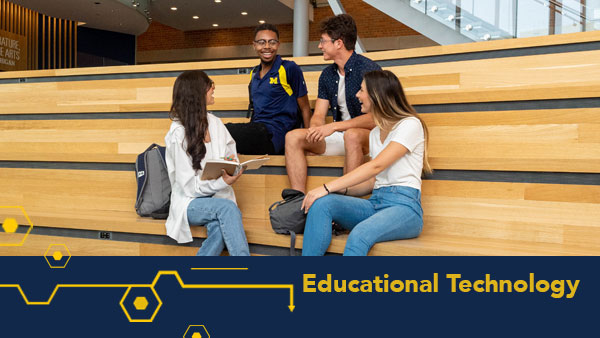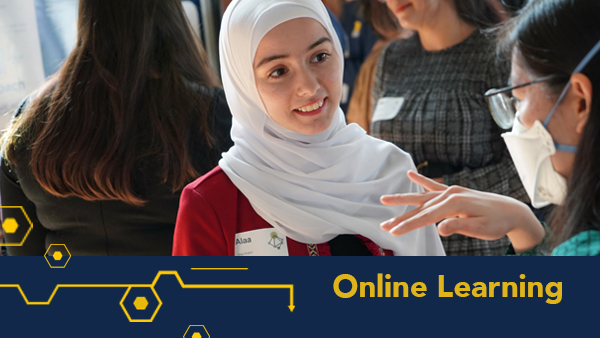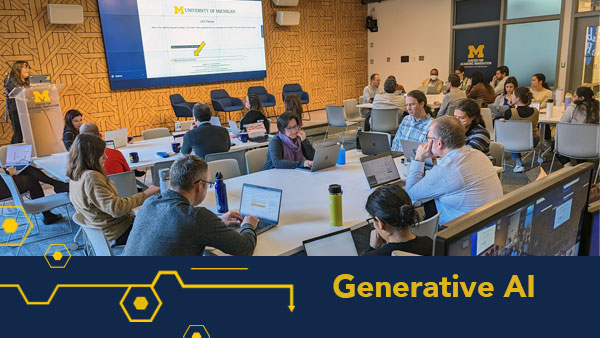Rachel Niemer, Director of Outreach and Access
Last spring, the Center for Academic Innovation released a call for proposals soliciting ideas for projects at the intersections of DEI; teaching and learning; and technology and innovation. Eight projects were approved.
Today, I’ll share brief descriptions of four of those projects. You can read about the four projects oriented to support pre-college learners in yesterday’s blog post. Join us on October 8 from 12 to 1:30 p.m. in the Great Lakes South conference room in Palmer Commons for the first AIM for DEI event of the semester, where we will celebrate the work of these fantastic teams.
Wellbook
Meghan Duffy, Ecology and Evolutionary Biology, College of Literature, Science and Arts
While there is broad recognition that we urgently need to improve graduate student mental health and wellbeing, figuring out how to actually do so has been extremely challenging. There are some issues that likely affect students broadly, and additionally, students from particular groups (e.g., first generation students, students of color, LGBTQ+ students, international students) are likely to face particular wellness coaching needs.
Inspired by ECoach and Exam Playbook, Wellbook is a tool that will provide personalized wellness coaching for PhD students at scale. This stage of the project will provide information for the design of Wellbook and the specific topics on which Wellbook should focus (e.g., sleep, work-life balance, navigating challenging mentoring relationships), including information on the unique needs of different groups of PhD students.
Improving the Academic Advising Experience for Underserved Learners
Kerri Wakefield, Director of the Engineering Advising Center, College of Engineering
Jennifer Taylor, Academic Advisor, Engineering Advising Center
Philip Gorman, Director of Academic Advising Information and Communications, Newnan Academic Advising Center, College of Literature, Science and Arts
Shannon Hennessey, Director of Undergraduate Student Affairs, School of Kinesiology
Katrina Vegter, Director of Academic Advising, Ross School of Business
This research project will study the academic advising experiences and needs of underserved learners with the goals of improving approaches to advising and developing a technology tool to make advising more accessible and beneficial for all undergraduate students. Anecdotal evidence suggests underserved learners may utilize advising centers at a lower rate than their peers, with the exception of programs and services targeted toward their identity groups. Underserved learners may have different advising needs, both academic and non-academic, than their peers. The first phase of this initiative will gather quantitative and qualitative data to explore how underserved learners currently utilize advising services, what their advising needs are, and ways to improve academic advising at the University of Michigan to better meet their needs.
U-M LGBTQ+ Oral History Archive Project
While many individuals in the U-M community support the principles of diversity, equity, and inclusion, LGBTQ+ histories and achievements are vulnerable to erasure without the documentation of their voices. Founded in 1971 by student leaders, the Human Sexuality Office (now known as the Spectrum Center), is the first university-staffed office addressing sexual orientation at an institution of higher learning throughout the country. Nearing its 50th Anniversary, the Spectrum Center is uniquely positioned to create a record of its lineage of founders, leaders, students, and alumni to sustain the legacy and history of LGBTQ+ communities at U-M. The U-M LGBTQ+ Oral History Project will center the voices and lived experiences of LGBTQ+ alumni, current and former staff, and faculty during their time on campus. This oral history digitization project will embed LGBTQ+ stories into the historical landscape of the university by sharing and preserving lived narratives in order to build knowledge, education, and connections between generations.
Online DEI Training Modules for Student Staff
Joe Salvatore, Director, Science Learning Center
Stephanie Walker, Associate Director, Science Learning Center
Kelley Emerson, Assistant Director, Science Learning Center
Santiago Bukovsky-Reyes, Study Group Program Manager, Science Learning Center
Emily Edgerton, Tutor Program Manager, Science Learning Center
This project trains university student staff members in topics of diversity, equity, and inclusion (DEI). Current DEI training for student staff is limited in availability and timing, siloed departmentally, and not necessarily well-researched to address the most relevant needs of U-M students. In addition, current trainings are not offered at scale to reach students working in peer support roles. The team will conduct focus groups to help identify specific training topics; potential subjects include: sense of belonging, implicit bias, stereotype threat, microaggressions, and bystander intervention. The goal of this project is to provide a set of resources that all university units could utilize to prepare student staff to confidently handle issues around DEI during their campus employment.


